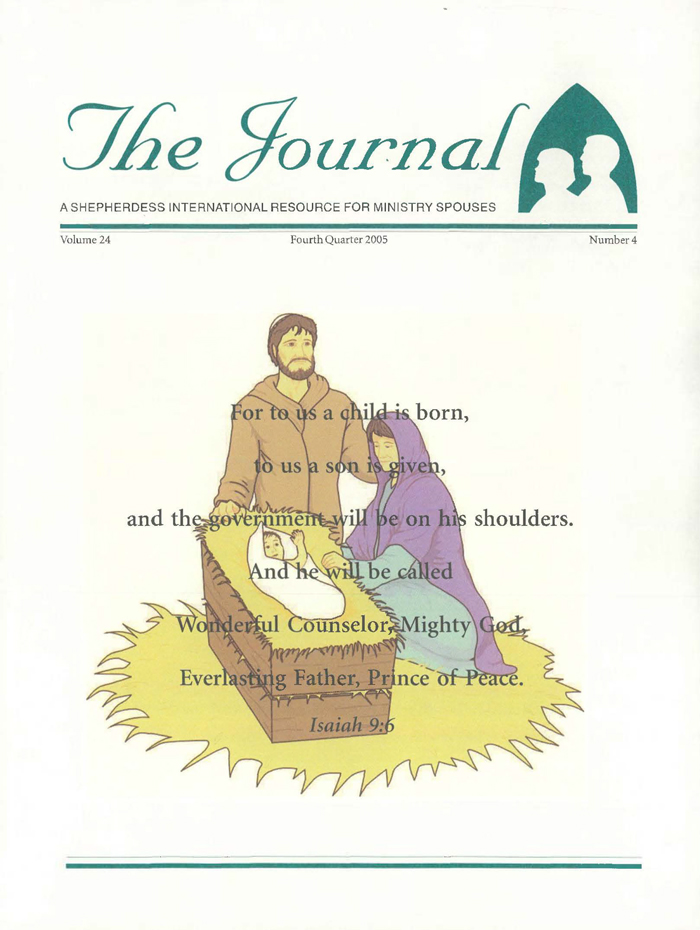We tend to think of burnout as being a modern-day syndrome. However, if you read the Old Testament, you will discover that Moses was on the verge of becoming an exhausted martyr by taking on too many duties. Fortunately, his father-in-law, Jethro, came to his aid with a cure for perfectionism.
In Exodus 18:13-24, we read that Moses was the only judge of his people and was thus overworked. His father-in-law inquired, "Why sittest thou alone judging from morning unto even?" (verse 14). He then warned Moses, "Thou wilt surely wear away, for this thing is too heavy for thee" (verse 18).
Next Jethro advised Moses to appoint other judges to settle the smaller matters and reserve his own strength and time for more important cases (verse 22). Wisely, Moses listened to Jethro and thus avoided burnout. Delegation is the cure for perfectionism.
Whether you are the CEO of a company or just the head of your household, the secret is delegating, pacing yourself, and setting priorities. Many mothers oflarge families soon learn that dividing up household chores among the children leads to a happier home. Even toddlers can be taught to dust and to pick up their toys. Teenagers who have regular duties grow up to be better parents themselves.
One 16-year-old young man I know loves to cook and regularly prepares Sunday-morning breakfast for his family. His 17-year-old sister learned to care for her younger siblings and, over the years, began babysitting for family and friends; now she has a tidy sum put away in a college fund.
Setting priorities is another method of avoiding exhaustion in our busy lives. Even the good can become the enemy of the best. When my five children were small, I had to choose between keeping a spotless house and making time for family fun. At nap time I could opt for more cleaning or instead spend an hour in prayer and Bible study and thus nourish my soul. In the evening, I read bedtime stories to my children instead of resting myself. It had the effect of quieting them so that they went to sleep at bedtime more readily. Once my children were all in school, I had the option of getting a part-time job or doing volunteer work. I chose to volunteer for hospice work rather than work for pay, figuring that the eternal rewards would be greater.
Dr. David Jeremiah, in his Turning Point publication, wrote, "When God is our top priority in life, we will be ruthless about cutting out those things that destroy the pacing of our journey toward godliness. When your life is rerun by foes or friends after your funeral, how many scenes will I wish had been left on the cutting room floor?" (December 28,2004).
In addition to setting priorities and delegating jobs, a third remedy for burnout is handling worry properly. Rick Warren, author of The Purpose-Driven Life, a bestseller, wrote: "If you're a worrier, there's hope for you, too. When you think about a problem over and over in your mind, that's called worry. When you think God's Word over and over in your mind, that's meditation. If you know how to worry, you already know how to meditate." The more we meditate on God's Word, the less we need to worry. In Psalm 23, David meditated on his great Shepherd instead of worrying.
My mother taught me a simple antidote to worry. She kept a jar in her cupboard labeled "Worries." Whenever she was concerned about something, she wrote it on a slip of paper and put it in the jar. She once told me, "When I get out those worries periodically, I find that most of the things never came to pass or the Lord just took care of them!" Last Christmas, a friend gave me a jar marked "Answered Prayers." That, too, is an ideal solution to worry.
In our fast-paced life today, it is easy to become an exhausted martyr! Like Moses, though, we can avoid that pitfall by learning to delegate, prioritize, and trust in our Heavenly Father!
